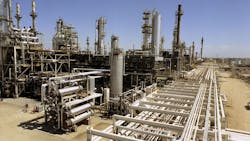ExxonMobil expands renewable diesel offtake agreement with California biorefinery
Global Clean Energy Holdings Inc. (GCEH) has secured ExxonMobil Corp. as the exclusive buyer of renewable diesel from GCEH subsidiary Bakersfield Renewable Fuels LLC’s (BKRF) biorefinery scheduled for startup in 2022 in Bakersfield, Calif. (OGJ Online, May 11, 2020).
ExxonMobil has amended its existing 5-year agreement with GCEH to expand its purchase of renewable diesel volumes from the biorefinery to as much as 5 million bbl/year, the operator said on Apr. 22.
The commitment to offtake increased renewables production from BKRF’s plant comes as part of the company’s efforts to support society’s ambitions for lower-emission fuels, according to Ian Carr, president of ExxonMobil Fuels and Lubricants Co.
“Through our growing relationship [with GCEH], we remain focused on bringing renewable fuels to market that make meaningful contributions to help consumers reduce their emissions,” Carr said.
ExxonMobil plans to distribute renewable diesel volumes from the Bakersfield plant within California and other potential US and international markets, the company said.
The revised offtake agreement follows ExxonMobil’s August 2020 commitment to purchase 2.5 million bbl/year of renewable diesel from BKRF’s biorefinery, which GCEH is in the process of completing as part of its May 2020 acquisition and conversion of Delek US Holdings Inc. subsidiary Alon Bakersfield Property Inc.’s former 70,000-b/d Bakersfield conventional crude refinery.
GCEH previously let a contract to Haldor Topsoe AS to license its proprietary HydroFlex renewable fuel technology as well as supply basic engineering, proprietary equipment, and catalysts for the refinery revamp, which—once completed—will enable the converted refinery to produce 15,000 b/d of renewable diesel from proprietary camelina oil and other traditional biofuel feedstocks (OGJ Online, June 9, 2020).
Alongside processing GCEH’s patented proprietary fallow-land crop varieties of camelina—which, traditionally grown in rotation with wheat, is cultivated as an alternative to fallow so as not to displace or compete with food crops—the HydroFlex unit will process a slate of additional nonpetroleum renewable feedstocks, such as used cooking oil, soybean oil, and distillers’ corn oil, among others.
Fuel production from the retooled refinery will meet the California Low Carbon Fuel Standard, as well as comply with ASTM D975 diesel specifications, resulting in major reductions of carbon dioxide emissions due to a lower carbon index.
Based on analysis of California Air Resources Board data, renewable diesel from various nonpetroleum feedstocks can provide lifecycle greenhouse gas emissions reductions of 40-80% compared to petroleum-based diesel, according to ExxonMobil.
“Our work at the Bakersfield biorefinery is a perfect example of what can be accomplished when an industry leader like ExxonMobil supports a growing renewables company like [GCEH] with long-term contracts,” said Richard Palmer, GCEH’s chief executive officer.
“By working together across traditional agricultural, energy, and supply chain lines, we are showing how [agriculture] and energy [companies], big and small, can collaborate to bring lower-carbon fuels to market,” Palmer added.
Once in operation, BKRF’s biorefinery will be the largest renewable fuels plant in the western US, the second largest in the entire US, and the country’s largest to produce renewable fuels from nonfood feedstocks, GCEH said in its 2020 annual report released on Apr. 13.
GCEH said it expects to complete engineering and construction of the Bakersfield project in early 2022.
About the Author
Robert Brelsford
Downstream Editor
Robert Brelsford joined Oil & Gas Journal in October 2013 as downstream technology editor after 8 years as a crude oil price and news reporter on spot crude transactions at the US Gulf Coast, West Coast, Canadian, and Latin American markets. He holds a BA (2000) in English from Rice University and an MS (2003) in education and social policy from Northwestern University.

